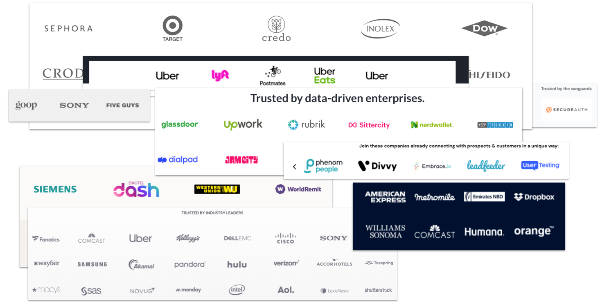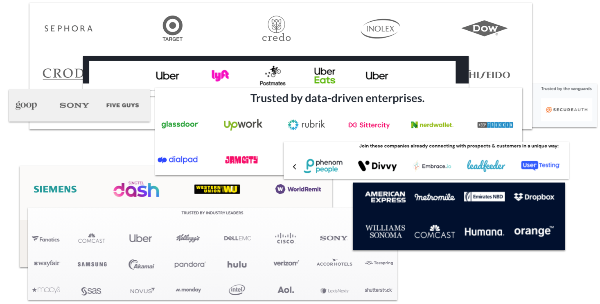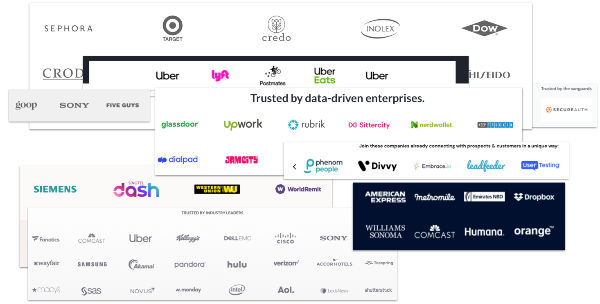

Imagine this: you come across a new, life-changing product. Maybe it’s a pet translator or maybe it’s the touch screen shower curtain you’ve always dreamed of. What’s the first thing you do?
You look for reviews.
The more grandiose the product’s promise, the more you’re going to want proof to back up that claim. But what if there aren’t any reviews? What if this revolutionary product is so new, that there isn’t social proof to validate its value?
You might scour Google looking for testimonials. Eventually, you might land on the company’s website and find yourself scrolling until you come across that much-vaunted (but ultimately valueless) banner of logos with a header like “As Seen In” or “Our Partners” or “Past Clients.”

The truth is that no matter how impressive their press, partners, or past clientele, those logos are going to spark a lot more questions than excitement because they beg for context.
Questions like:
– Was that feature in Wired paid or earned?
– What does “partner” mean exactly?
– What did that client actually think of the product?
– Or if this company worked with such big names, how come I’ve never heard of them before?
– Even if the Founder/CEO of the company could answer all your questions, would that make you trust the product anymore?
Probably not.
That’s understandable. Consumers today are conditioned to distrust ads and marketing lingo. Enterprises seeking to innovate are even more skeptical.
Client logos & case studies don’t count for much if you can’t back them up.
A lot of enterprises have been burned by startups that overpromise and under-deliver, so they’re reluctant to take risks on unproven products. Sure, some startups can provide testimonials or even case studies. But testimonials can be taken out of context, and since startups author their own case studies, even those are taken with a grain of salt.
On the flip side, a lot of startups whose products show real promise (backed by data) have to fight tooth and nail to earn the trust of prospective enterprise customers, usually wasting months of precious time on repetitive education meetings in the process.
And therein lies the rub:
- Enterprises need more than a startup’s word to feel confident investing in innovation. At the same time, they can’t innovate if they wait to adopt a new technology until after everyone and their mom has proven it works.
- Startups can’t survive if they spend all their time and energy trying to earn trust – rather than implementing and improving their technologies.
So how do we move beyond this impasse?
The answer: evidence.
What do we mean by evidence?
When it comes to sourcing startups and vetting potential partners, sometimes case studies just don’t cut it.
If you’ve ever read startup case studies, in particular, you’ll know that – more often than not – they’re missing critical information like project duration, ROI, and other key factors that may influence your investment decision. While they might describe how a startup’s product miraculously solved the customer’s problem, they don’t offer proof to back up their claims. They might even be reluctant to give you the past customer’s contact information, so you can’t verify these claims for yourself.
That’s why entrapeer uses evidence to curate an ecosystem of verified startups with proven success. How?
Well, it goes a little something like this:
When a new startup joins entrapeer, we ask startups the questions that enterprises need answers to and present only the most vital information stripped of all the marketing fluff. This evidence includes case studies, but it’s a lot more than that. It’s stuff like market insights, technical papers, ROI, project duration, startup certifications, and much more. But that information alone doesn’t solve the trust issues inherent to an enterprise-startup partnership.
That’s why we offer third-party verification.
You see, in our 5 years of innovation matchmaking, enterprises requested customer references and VC insights so they could verify startups’ claims in 8 out of 10 projects. The problem was that there wasn’t a process to ensure the authenticity of those references, and startups were understandably reluctant to ask the same enterprises for recommendations each time they got a new lead. Not to mention, past customers don’t always feel comfortable (or want to spend the time) speaking to a startup’s prospective customers.
That’s where we come in.
We act as an objective third party and confirm a startup’s results with their VC, past customers, and any other players. Plus, that evidence will live on our innovation platform forever – no more awkward outreach asking the same customers for new reference meetings. That way, enterprises can base their innovation investments on proven facts – not baseless promises – while startups can show off their successes and start their sales calls on a foundation of trust.
Wanna learn more?
Contact us to see for yourself how entrapeer’s making innovation more attainable than ever.

